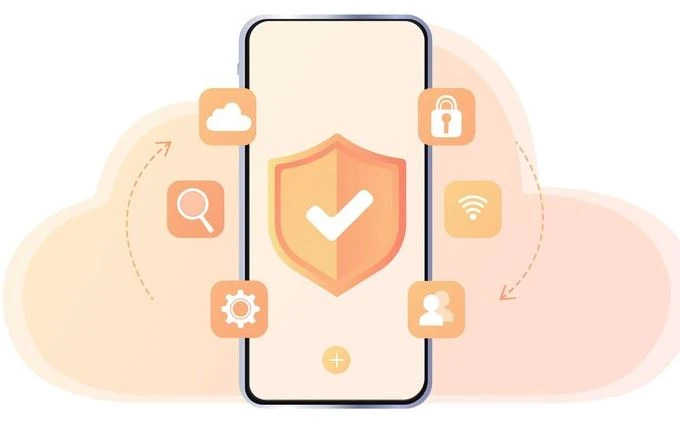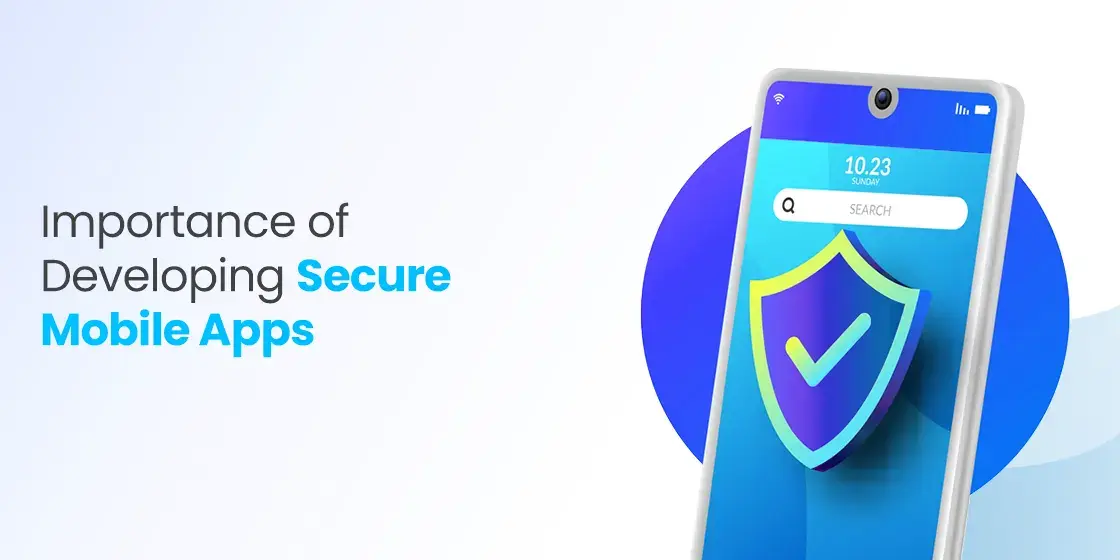Table of Content
Explore Best Practices to Secure all Types of Mobile Applications Below
Security in mobile apps and websites is considered extremely important. No business can afford to keep gaps or loopholes in the security of its apps. Ecommerce companies are more vigilante in this regard, as their apps regularly deals with tons of transactions. Some recent events involving data and funds theft have further solidified the importance of app security. It has now become a core pillar of app development that cannot be neglected by any means. It is therefore recommended to always take app development services from a reputed agency, as that makes sure to build professional mobile apps covering all the security bases.
The recent rise in online attacks has forced companies to employ solid security strategies. They understand that hackers can easily steal confidential data and information from the apps if they are not completely protected. This is not just about keeping the funds secured, but also protecting the valuable customer data. People generally trust on those apps that have deployed all the important security measures. They are also aware of the challenges online businesses are facing these days, hence they always try to use only those apps that are firmly secured.
If you also want to know how to build secure mobile apps to win the trust of users, read this blog completely. It will let you know about app security in detail, as how it should be deployed in the apps following all the standard procedures. Let’s start from the basics understanding why security is important for all types of business websites and apps.
Importance of Security for Websites & Mobile Apps

Security is paramount for business websites and mobile apps due to the sensitive nature of the information they handle on daily basis. Firstly, customer data such as personal details, payment information, and transaction history are prime targets for cybercriminals. A breach not only compromises customer trust but also exposes the business to legal repercussions and financial losses. Ensuring robust security measures safeguards this critical data, preserving customer confidence and protecting the business’s reputation.
Secondly, security is essential for maintaining the integrity and availability of business operations. Downtime resulting from cyberattacks can disrupt services, leading to loss of revenue and productivity. Businesses rely heavily on their online presence for sales, communication, and collaboration. Any disruption caused by security breaches can significantly impact their ability to function effectively, potentially driving away customers and damaging competitiveness. Implementing strong security protocols minimizes the risk of downtime and ensures uninterrupted business continuity.
Safeguarding against security threats is essential for compliance with regulatory standards and industry best practices. Many sectors, such as finance, healthcare, and e-commerce, are subject to stringent data protection regulations like GDPR, HIPAA, and PCI DSS. Failure to comply with these standards not only invites fines and penalties but also erodes customer trust and credibility. By prioritizing security, businesses demonstrate their commitment to ethical practices and regulatory compliance, fostering trust among customers and stakeholders while mitigating the risk of legal repercussions.
Types of Security Threats You Need to Remember

A mobile app can be targeted in different ways by the hackers. Some people think that web attacks only happen in the form of data breach. Well, this is an outdated conception, because hackers are now using various practices to target different areas.
As a mobile app developer, you need to know about them in detail. It prepares you in advance, giving you an edge to anticipate them before they even happen. Here are some of the common practices used by the hackers to disrupt the operations mobile apps. These are mostly targeted towards ecommerce apps, as they contain valuable information about funds and user data.
Data Outflow
Recent research findings indicate that 85% of mobile applications lack adequate security measures, leaving them vulnerable to exploitation by hackers and cybercriminals. This glaring security gap has prompted malicious actors to intensify their efforts in targeting mobile infrastructures. Exploiting weaknesses in these apps, hackers capitalize on the permissions granted by users upon installation, leveraging access to sensitive data stored on the device. Beyond compromising the intended functionality of the app, such breaches can lead to unauthorized access to critical information, including digital wallets and passwords.
When users download mobile apps, they often overlook the implications of granting permissions, unaware of the potential security implications. Consequently, hackers exploit this inherent trust, infiltrating vulnerable applications to pilfer sensitive data stored on users’ devices. This highlights the critical importance of implementing robust security measures within mobile applications to safeguard against such threats. Beyond traditional security protocols, developers must prioritize measures such as encryption, multi-factor authentication, and regular security updates to fortify their apps against evolving cyber threats.
Malware Attack
Mobile apps, akin to computers, face the constant threat of malware infiltration, posing significant risks to device security and user privacy. Recent studies have shed light on the varying susceptibility of different mobile platforms to malware, with Android devices emerging as particularly vulnerable targets. Shockingly, statistics reveal that Android devices are a staggering 47 times more likely to harbor malware compared to their Apple counterparts. This heightened risk on Android stems from the platform’s greater flexibility in supporting third-party app stores that are not entirely secured.
The prevalence of misconceptions among users further exacerbates the vulnerability of mobile devices to malware threats. A concerning revelation from surveys indicates that nearly one in four individuals harbor the belief that downloading third-party mobile apps poses no risk as long as these apps refrain from accessing corporate data. This misconception underscores the importance of educating users about the potential dangers lurking with the downloads of unknown apps, particularly for Android users.
Social Engineering
The prevalence of social engineering attacks targeting mobile users is steadily increasing, with phishing emerging as a particularly pervasive threat. In these sophisticated schemes, hackers leverage deceptive tactics such as fake emails, text messages, or malicious advertisements to dupe unsuspecting individuals into divulging sensitive information, including passwords and personal data. Instances of receiving seemingly legitimate correspondence, purportedly from reputable entities like Apple or other established businesses, urging recipients to reset passwords or update payment information, are alarmingly common.
The evolving landscape of mobile-based social engineering underscores the critical need for enhanced awareness and vigilance among users. With cybercriminals continually refining their strategies to exploit human vulnerabilities, it is imperative for individuals to remain discerning and cautious when interacting with digital communications. Heightened awareness of common phishing tactics, such as suspicious requests for personal information or urgent demands for account verification, can empower users to recognize and mitigate potential threats effectively.
Profile Credentials Theft
Presently, our society grapples with a significant challenge concerning password security. The proliferation of various digital tools, accounts, and subscriptions has led individuals to resort to the risky practice of password reuse across multiple platforms. However, this approach poses a grave security threat, as the compromise of one account grants hackers unfettered access to other linked accounts. This interconnectedness amplifies the potential damage inflicted by cybercriminals, enabling them to exploit vulnerabilities across an individual’s digital footprint.
The ramifications of compromised passwords extend beyond individual accounts, posing substantial risks to organizational data and user privacy. Consider the scenario where a member of a software development team falls victim to a password breach. If a hacker gains access to their credentials, they could exploit this access to infiltrate the backend of the organization’s software infrastructure. This unauthorized entry not only jeopardizes the confidentiality and integrity of sensitive organizational data but also exposes app users to significant security vulnerabilities.
Outdated Software Usage
Neglecting to ensure the timely updating of all devices, software applications, and operating systems poses a critical vulnerability in mobile security. With the continuous evolution and sophistication of malware, ransomware, and other cyber threats, outdated software is rendered ill-equipped to detect and defend against newer attack vectors. However, it is worth noting that many software updates are designed to include essential security patches aimed at fortifying defenses against emerging threats. This principle holds particularly true for mobile apps, devices, and overall mobile security infrastructure.
The importance of software updates in bolstering mobile security cannot be overstated, as these updates serve as crucial mechanisms for addressing known vulnerabilities and strengthening the overall resilience of mobile systems. By promptly installing updates, users can avail themselves of vital security patches intended to mitigate the risk of exploitation by cyber adversaries. Moreover, staying abreast of the latest tech trends in the UAE ensures that mobile devices and applications remain equipped with the advanced security features, thereby enhancing their ability to thwart potential threats and safeguard sensitive data.
Essential Mobile App Security Tips You Need to Remember

Every developer should know how to build secure mobile apps. This is an important requirement of the modern dev industry which should not be neglected by any means. Unfortunately, many beginners do not have enough idea about the app security. The tips given below will surely help them to understand how the app security works. Let’s take a quick look at them below.
Anticipate All Attack Moves
During the development process of your mobile app, it is imperative to adopt an attacker’s mindset and rigorously assess its security posture. Pose critical questions aimed at identifying potential vulnerabilities within the app’s architecture, such as whether it can be easily exploited, if the code is susceptible to cracking, or if the app is prone to hacking. Addressing these queries head-on enables developers to proactively identify and mitigate security weaknesses, safeguarding the app against potential cyber threats.
No detail is too minor when it comes to fortifying the security of your developing mobile app. Even seemingly insignificant vulnerabilities can serve as entry points for cybercriminals and hackers to compromise the application’s integrity. Therefore, it is essential to diligently address and rectify any identified vulnerabilities, implementing robust security measures to fortify the app’s defenses against unauthorized access or exploitation. By prioritizing security throughout the development lifecycle, developers can minimize the risk of security breaches right from the start.
Select a Reputed Platform
Research indicates that selecting the appropriate platform for app development can significantly mitigate security vulnerabilities, with up to 90% of such risks effectively addressed. Leading mobile app development frameworks integrate robust security features directly into their systems, offering developers peace of mind regarding the safety of their apps within the platform’s security architecture. By leveraging these platforms, developers can capitalize on built-in security measures, bolstering the resilience of their apps against potential cyber threats.
However, opting to code the app independently or delegating its development to any third-party agency introduces additional security considerations. If the team lacks expertise in app security or neglects essential security protocols, the app becomes vulnerable to exploitation. To mitigate these risks, it is imperative to carefully select a development platform that prioritizes advanced security protocols, thereby minimizing the likelihood of security breaches and ensuring the protection of sensitive data throughout the app’s lifecycle.
Perform Security Testing
Performing regular security testing is essential to ensure the robustness and resilience of a mobile app against potential cyber threats. One effective approach is to integrate security testing into the app development lifecycle, conducting assessments at various stages of the development process. This proactive approach allows developers to identify and address security vulnerabilities early on, minimizing the risk of potential exploits. Security testing methodologies such as static analysis, dynamic analysis, and penetration testing can be employed to assess the app’ code and functionalities comprehensively.
Additionally, regular security testing should extend beyond the development phase to encompass post-deployment evaluations. Once the app is live, conducting periodic security audits and vulnerability assessments is crucial to detect and mitigate any new or evolving threats. Continuous monitoring of the app’s performance and behavior, enables developers to promptly respond to live security breaches. Moreover, leveraging automated security testing tools and services can streamline the process of identifying vulnerabilities and ensure comprehensive coverage across the app’s entire attack surface.
Use Data Encryption
Implementing data encryption is critical to safeguarding sensitive information within a mobile app both during and after its creation. To integrate encryption effectively during app development, developers should adopt a multi-layered approach that encompasses both data in transit and data at rest. For data in transit, leveraging secure communication protocols such as HTTPS for web traffic and SSL/TLS for network communications ensures encryption of data exchanged between the app and external servers. Additionally, employing strong encryption algorithms such as AES to encrypt data further enhances the security of sensitive information.
Utilizing platform-specific encryption APIs provided by mobile operating systems, such as Android’s KeyStore and iOS’s Secure Enclave, facilitates secure storage and management of encryption keys. Developers should employ industry-standard encryption algorithms to encrypt sensitive data stored locally on the device, ensuring its confidentiality even if the device is compromised. Regularly updating encryption protocols and algorithms in line with industry best practices and compliance standards is essential to maintain the effectiveness of data encryption measures over time.
Build Advanced and Secured Mobile Apps with StruqtIO
StruqtIO is a top source where you can get quality mobile app development services. Our developers understand the intricacies of security, hence they always make sure to develop apps employing all the core security firewalls. This gives us an edge over others, as we build mobile apps keeping all the best security practices in check.
In addition to mobile app development, StruqtIO offers a wide range of custom software solutions tailored to your specific requirements. Whether you require .NET development or cloud integration services, we are equipped to assist your business across various domains. Our team of experts is dedicated to providing comprehensive support and expertise, ensuring that your business receives top-notch assistance from a reputable agency.
Frequently Asked Questions
| Why security is important for mobile apps and business websites? Security is paramount for mobile apps and business websites to safeguard sensitive data, protect assets against cyber threats. Without robust security measures, they are vulnerable to breaches, data theft, and reputational damage, which can have severe consequences for businesses. |
| What is meant by malware attack? A malware attack is a malicious intrusion where harmful software infiltrates a system to disrupt operations, steal data, or cause damage to devices or networks, posing significant risks to security and privacy. |
| How to perform app security testing? App security testing involves thorough assessments using methodologies like static analysis and dynamic analysis. It helps to identify vulnerabilities in the code, supplemented by penetration testing to simulate real-world attacks, ensuring robust protection against cyber threats. |
Final Words
That brings us to the end of this blog in which we have discussed the importance of app security. Nowadays, every developer understands how crucial it is to build mobile apps integrated with top-notch security features. This blog has highlighted all the key things related to app security, as how it should be implemented and what type of practices should be followed to make an app secure. It is therefore a good read for all the beginners, defining how online threats should be eliminated by utilizing right security practices.

Empower your digital journey with StruqtIO - Your dedicated partner for cutting-edge custom software development, innovation, and digital transformative solutions. Harness the power of technology to elevate your business and redefine your digital landscape today.


